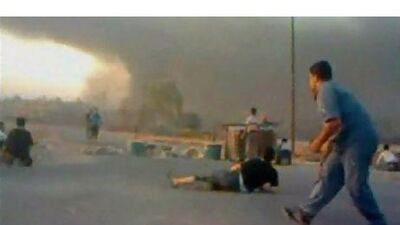BEIRUT // Syrian troops kept up attacks on the city of Hama yesterday, a day after a brutal crackdown on anti-government protesters killed at least 70 and drew harsh rebukes from the US and Europe.
The European Union expanded its sanctions against Syria, imposing asset freezes and travel bans against five more military and government officials. The EU decision brings the number of individuals targeted by the EU to 35, including the president Bashar Al Assad. Four government entities are also on the list.
Sunday was one of the bloodiest days since the uprising against Mr Al Assad's authoritarian rule began in mid-March. Six Syrian rights groups said in a joint statement that 74 people were killed throughout the country, 55 of them from Hama and neighbouring villages.
Syrian troops backed by tanks renewed shelling of Hama for a second day yesterday in an attempt to subdue the city.
Hama resident Saleh Abu Yaman said there was heavy shooting in the north-eastern Hamidiyeh neighbourhood - which he described as a hotbed of anti-regime activists. Rami Abdul-Rahman, the head of the London-based Syrian Observatory for Human Rights, said troops raided Hamidiyeh and killed at least two people and wounded 10. He cited hospital officials in the city.
Mr Abdul-Rahman said security forces shot another person dead in the eastern town of al-Boukamal near the border with Iraq. The Local Coordination Committees, which helps organise anti-government protests, said five people were killed yesterday of which three were in Hama, one in al-Boukamal and another in the nearby city of Deir el-Zour.
"Residents are committed to resistance through peaceful means," Hama-based activist Omar Hamawi said by telephone yesterday. The city's streets are full of barriers as well as thousands of men "who are ready to defend the city with stones," he said. "People will not surrender this time. We will not allow a repetition of what happened in 1982."
Mr Al Assad praised troops for "foiling the enemies" of Syria, the state news agency Sana said yesterday.
In a speech marking the 66th anniversary of the Syrian army's formation, Sana cited Mr Al Assad as saying that the military "proved its loyalty to its people, country and creed".
"Its efforts and sacrifices will be admired," he was quoted as saying, adding that "these sacrifices succeeded in foiling the enemies of the country and ending sedition, preserving Syria."
In the speech, which Sana republished in English from the People's Army magazine, Mr Al Assad saluted the armed forces, calling them a "model of commitment to the nation's causes and a defender of its rights".
"Syria is used to creating victories and defeating the enemies ... it knows how to do it to add a new victories and leave warmongers and blood merchants to taste the bitterness of defeat and disappointment," he was quoted as saying. The escalating government crackdown appears aimed at preventing the protests from swelling during Ramadan. Muslims throng mosques during Ramadan for special night-time prayers after breaking their daily dawn-to-dusk fast. The gatherings could trigger intense protests throughout the predominantly Sunni country and activists say authorities are trying to prevent that.
The worst carnage on Sunday was in Hama, the scene of a 1982 crackdown by Mr Al Assad's late father and predecessor and a city with a history of defiance against 40 years of Al Assad family rule. Hospitals there were overwhelmed with casualties, suggesting the death toll could rise sharply, witnesses said.
It appeared the regime was making an example of Hama, a city of about 800,000 people about 210 kilometres north of the capital, Damascus. The city has largely fallen out of government control since June as residents turned on the regime and blockaded the streets against encroaching tanks.
The US president, Barack Obama, on Sunday called the reports "horrifying" and said Mr Al Assad is "completely incapable and unwilling" to respond to the legitimate grievances of the Syrian people.
Yesterday, Britain's foreign secretary, William Hague, said there was no prospect of international military intervention in Syria.
* Associated Press with additional reporting by Agence France-Presse

